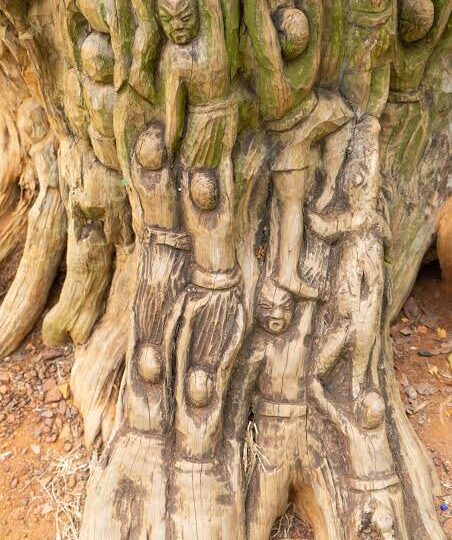For centuries, storytelling has been the lifeblood of African societies, serving as a powerful medium for education, entertainment, and cultural preservation. Long before the advent of written records, oral traditions were the primary means of passing down history, morals, and communal values from one generation to the next. These stories were not merely tales told for amusement—they were foundational to the identity, spirituality, and social cohesion of African communities.
From the griots of West Africa to the folklore of the San people in Southern Africa, storytelling took many forms, each with its own unique style and purpose. Whether through myths, proverbs, fables, or epic poetry, African oral traditions have shaped worldviews, preserved history, and instilled wisdom in listeners for generations.
The Role of Storytelling in African Societies
In traditional African societies, storytelling was far more than a pastime—it was a vital social institution. Stories were told during important gatherings, such as festivals, initiation ceremonies, and evening fireside sessions. Elders, griots, and community leaders were the custodians of these narratives, ensuring that knowledge was preserved and transmitted accurately.
Some key functions of storytelling included:
1. Preserving History and Genealogy
Unlike Western societies that relied on written records, African communities depended on oral historians to keep their past alive. Griots in West Africa, for example, memorized centuries of history, including the lineages of kings, great battles, and the founding of empires. Their role was so crucial that they were often attached to royal courts, ensuring that the deeds of leaders were never forgotten.
2. Teaching Moral and Ethical Lessons
Many African folktales were designed to teach young people about virtues such as honesty, bravery, and respect. Animal fables, like those featuring the cunning spider Anansi (common in West Africa and the Caribbean), used humor and wit to illustrate the consequences of greed, laziness, or arrogance.
3. Explaining Natural Phenomena
Before the advent of modern science, myths and legends provided explanations for natural events. Creation stories, such as the Yoruba myth of Oduduwa or the Zulu tale of Unkulunkulu, described how the world came into being. Other stories explained the origins of rivers, mountains, and celestial bodies, embedding spiritual significance into the landscape.
4. Strengthening Community Bonds
Storytelling was a communal activity, bringing people together to share in collective wisdom. The act of listening and responding to a storyteller fostered unity, as entire villages would gather under the moonlight to hear tales of heroes, ancestors, and mythical creatures.
Forms of African Storytelling
African oral traditions were incredibly diverse, varying by region, culture, and purpose. Some of the most prominent forms included:
1. Griots and Oral Historians
In West Africa, particularly among the Mandinka, Wolof, and Fulani peoples, griots (or jalis) were revered as living libraries. They memorized genealogies, historical events, and epic poems, such as the Sundiata Epic, which recounts the rise of the Mali Empire. Accompanied by instruments like the kora or balafon, their performances were both educational and entertaining.
Griots were more than just storytellers—they were advisors, diplomats, and cultural guardians. Their words carried weight, and their ability to recite history with precision made them indispensable to their communities.
2. Folktales and Fables
Animal trickster tales were among the most popular forms of storytelling across Africa. These stories often featured clever, mischievous characters who outwitted stronger opponents, teaching listeners the value of intelligence over brute force.
- Anansi the Spider (Akan, Ghana): A cunning figure who often found himself in trouble but used wit to escape.
- Hare (East and Southern Africa): Similar to Br’er Rabbit, the hare outsmarted larger animals like the lion or hyena.
- Tortoise (Igbo, Nigeria): Known for his wisdom, though sometimes his tricks backfired humorously.
These tales were not just for children—they contained deep philosophical lessons about human nature, justice, and survival.
3. Mythology and Creation Stories
African cosmologies are filled with rich myths about the origins of the universe, gods, and humanity. Some well-known examples include:
- The Yoruba Creation Myth (Nigeria): The deity Oduduwa descended from the heavens to create the Earth, while Orishas (spirits) governed natural forces.
- The San People’s Stories (Southern Africa): The San believed in a trickster god, Kaggen, who shaped the world and its creatures.
- The Dogon and Sirius (Mali): The Dogon people’s astronomical knowledge, passed down orally, included detailed accounts of the star Sirius long before modern telescopes.
These myths were not just religious narratives—they were frameworks for understanding existence, morality, and humanity’s place in the cosmos.
4. Proverbs and Oral Poetry
African languages are rich in proverbs—short, pithy sayings that encapsulate wisdom. Among the Akan, the phrase “Se wo were fi na wosan kofa a yenkyiri” (“It is not wrong to go back for what you have forgotten”) emphasizes the importance of correcting mistakes.
Oral poetry, often performed with music, was another key tradition. Praise singers (imbongi among the Zulu) recited poetic verses to honor leaders, warriors, and ancestors, blending history with artistic expression.
The Legacy of African Storytelling Today
Though modernization has shifted how stories are shared, African oral traditions remain influential. Writers like Chinua Achebe, Ngũgĩ wa Thiong’o, and Amos Tutuola have drawn from folklore in their novels, ensuring that these narratives reach global audiences.
Additionally, contemporary African filmmakers, musicians, and poets continue to reinterpret traditional stories, proving their timeless relevance. The griot tradition lives on in modern hip-hop and spoken word, where artists serve as today’s storytellers, blending ancient wisdom with contemporary issues.
African storytelling is a testament to the continent’s intellectual and cultural richness. These oral traditions were not just entertainment—they were the foundation of education, history, and spirituality. From the epic recitations of griots to the playful wisdom of Anansi, African stories have shaped identities, preserved legacies, and connected generations.
Even today, as the world becomes increasingly digital, the power of these narratives endures, reminding us of the universal human need to share, teach, and remember through stories. The voices of the past still speak, and their lessons remain as vital as ever.

